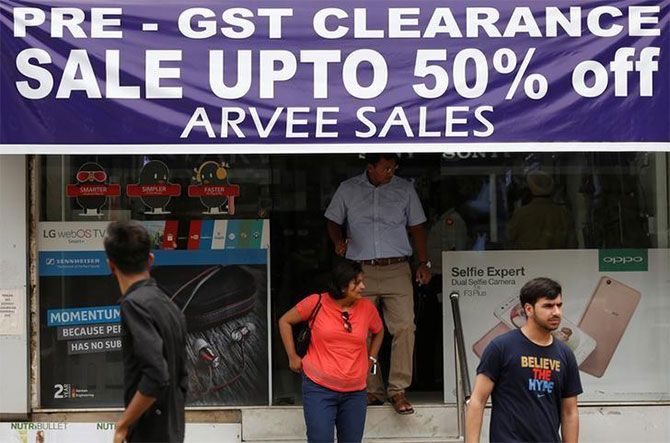'If there is a new person entering the system, we shall say, welcome. We shall not open his past. Because we don’t know it and therefore it’s a new business for us.'
'Our anti-profiteering rules are not meant for applying against small business.'

“I shall not give any more interviews,” said Hasmukh Adhia, bottom, left, revenue secretary, adding, “there is just too much to do, in the last week”.
He is the man everyone in India’s trade and industry wants to talk to before the Goods and Services Tax (GST) is rolled out on the midnight of June 30. It is therefore possibly the last one that he has given before the appointed date to a select group, on DD News where Business Standard was also present. Excerpts:
Isn’t the compliance rating system introduced by GST, onerous for business?
I would reiterate that the compliance hassles would be lower with GST. The final retail sellers should have no issue whatsoever.
Even for business to business, the procedure is simple. Each of them would have to file only one return by the tenth of every month, which they can construct from the Excel sheet we have provided free of cost on our website.
The second and third returns get auto populated on that basis and needs to be changed only if the buyer and seller differ on the tax paid.
Here too, the buyer of the service or goods will be given an automatic input tax credit, if he claims to have paid the tax.
There is a check by the system after a month if the seller disagrees with the buyer about the amount or evades the tax.
In that case the buyer has to contact the seller about the discrepancy and sort it out in the next 30 days.
If the seller still refuses the tax claim, the department will reverse the credit given to the buyer. So, just as the department will pursue the seller, the buyer, too, has to ensure the seller pays the tax.
These compliance ratings will be put in public domain, so other businessmen can exercise caution when dealing with them.
So, there is a mutual invoice matching which ensures the reason why GST was brought in the first place, functions.
 Some of the resistance to GST comes from this necessity to keep a check or compliance about each other.
Some of the resistance to GST comes from this necessity to keep a check or compliance about each other.
But, I have full confidence that Indian entrepreneurs will make the change over smoothly.
There will be a large number of new businesses who will enter the tax chain with GST. Would you try to examine their past?
If there is a new person entering the system, we shall say, welcome. We shall not open his past. Because we don’t know it and therefore it’s a new business for us.
Whatever his turnover was is history and could have been dealt with only within the previous law. That means only if there was a case made out against him earlier, that stays.
But, otherwise it is a clean chit and there will be no retrospective application.
Do you expect any shortfall in indirect tax receipts in the first couple of months since you have given a forbearance period of two months to business to comply with?
I will like to keep my fingers crossed on revenue projections for this year. We have been very modest (in our) estimate of growth in indirect tax receipts. It is not more than 9 to 10 per cent.
It was made keeping in view the uncertainty over GST. The benefits we are also giving is also large as the rates are soft. This has to be made good by compliance.
For July and August particularly, may be some of the companies would be conservative, at the same time the bigger companies I do not think will want to delay.
Because after two months, we shall compare the summary returns with actual ones. There is a flip side to not paying the tax on time.
There will be an interest for not paying a tax on time. So the money should come in, on time.
There have been complaints that some insurance companies and builders have sent mailers to clients telling them that taxes would rise after GST comes in. What’s you reaction to them?
Suppose you've booked a flat for a fixed price and the project is unfinished as on July 1.
With GST the tax on the project changes from a lower rate but which was composite to one based on higher rate but with input tax tax credit.
We demand that the builder or insurance company must pass on this benefit to the client.
He has to effectively reduce the price by this credit and then charge the higher tax for the remaining amount due.
If there are any such complaints, those will go to the state level groups we have set up specifically for this or even to the concerned sector regulators like RERA for instance, in the case of real estate.
But let me also assure that our anti-profiteering rules are not meant for applying against small business.
We do not intend to use the clause against shopkeepers, petty contractors and so on. It is for the large companies lie say a rogue builder or financial sector company that refuses to pass on the benefit of input tax credit to the purchasers.
Photograph: Adnan Abidi/Reuters












 © 2025
© 2025